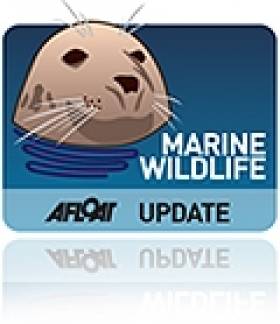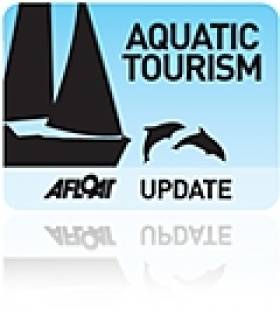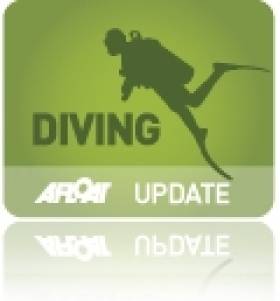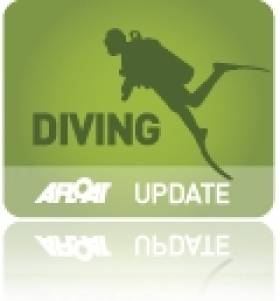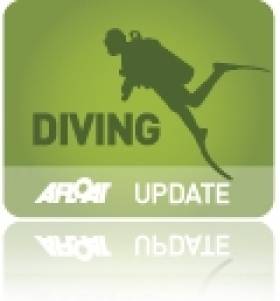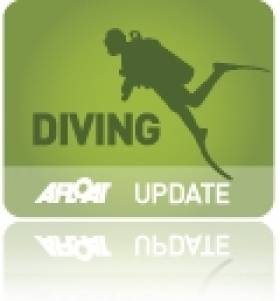Displaying items by tag: SCUBA Diving
Colonel Michael Moriarty 1931-2022, Pioneer of Scuba Diving in Ireland
Colonel Michael Moriarty, known to most people as Mick, passed away on Thursday, November 3rd, aged ninety. He was a very affable, kind, and generous-hearted man, and all who knew him would agree that he was a fine gentleman who was very popular and well-liked. He will be sadly missed by a great many people in so many walks of life, particularly by his loving family, including his sons Darragh and John, daughter Niamh, his grandchildren who adored him, and his extended family members. Mick was predeceased by his wife Anne.
He will also be missed by his former comrades in arms in the Irish Army, by the United Nations personnel with whom he served in many parts of the globe, and by the scuba diving population of Ireland, for it is to Mick and a small group of his friends that we owe the growth of the wonderful sport of scuba diving in Ireland. Mick was one of the very first people in Ireland to embrace the sport, and he worked tirelessly in different organisations to help it to expand into a nationwide sport which is enjoyed by many thousands of members today.
Mick was born in Bandon in County Cork on December 21st, 1931, but he grew up in Listowel in Kerry and Ennis in County Clare. From an early age, he was attracted to the water and became a powerful swimmer. But it seemed to be always on the cards that he would be attracted to military life, for as soon as he was old enough in 1949, he enrolled in A. company of the Ennis Battalion of the F.C.A (An Forsa Cosanta Aitiul) the part-time defence force.
After a year in the FCA Mick enlisted in the regular army as a member of the 25th Cadet Officer Training Class in November 1950 and after two years, he was posted to an artillery regiment, a Corp in which he would remain for the rest of his military career. Mick rose steadily through the ranks and he served in a variety of artillery units, becoming Director of Artillery in 1989. When Mick retired in January 1992 he held the rank of Colonel and he was serving as Second in Command of the Eastern Brigade.
Mick had a long and distinguished history of service abroad with the United Nations, on peacekeeping missions in several countries, beginning as a platoon commander in the Congo in 1961. He served in Cyprus in the mid-sixties and he was an observer from 1974 with the UN Truce Supervision Organisation, serving initially on the Golan Heights. He was a Company Commander with the 46th Infantry Battalion in Lebanon from 1979, and he was later Senior Operations officer in Lebanon for two years. He was the Senior Officer in the United Nations Transition Assistance group in Namibia in 1989 and he became the Chief Liaison Officer to the United Nations Verification Mission in Angola, and it was here that he became interested in Portuguese, in which he became proficient. Mick’s wife Anne and their three children accompanied him on several of these postings.
Mick had an intense attraction to the sea and in his early days as a young officer, he swam in the sea whenever he got the opportunity When Mick first got the chance of going on a dive with a borrowed Aqua Lung in Galway, he was already an experienced fin swimmer and snorkeller. Spearfishing is today regarded by many as being a bit un-PC, but back in the day it was a very popular pursuit which demanded a high level of water fitness, and an ability to hold ones breath underwater for extremely long periods. Mick and his colleagues were ultra-proficient at this sport. Mick and some of his spear-fishing colleagues represented Ireland in several international competitions in places as far away as Cuba. He remarked that his first dive was everything he expected it to be and he was hooked for life. Most of the diving cylinders that were available in the 1950s were surplus compressed oxygen bottles from aircraft and were known as Tadpoles on account of their small size. Money was scarce in the 1950s and diving gear was expensive, and over the years Mick has written several humorous accounts of the improvisations indulged in by himself and his early diving colleagues. Wetsuits were virtually unheard of at the time and the standard underwater dress to try to allay the cold was several woollen jerseys and woollen long johns. It was not uncommon for divers to be on the verge of hypothermia after a dive in this gear. Later improvements consisted of coating the woollen long johns and vests with liquid rubber in situ on the diver and allowing it to dry, with sometimes painfully disastrous results as the rubber adhered to flesh and hair as well as the wool.
 Scuba superstar – Mick Moriarty with the Glaucus Trophy
Scuba superstar – Mick Moriarty with the Glaucus Trophy
During a posting to the Curragh Camp in County Kildare in 1958, Mick and three of his colleagues decided to form a diving group which became known as the Curragh Sub-Aqua Club, which sixty four years later has grown to become one of the premier diving clubs in Ireland, with a large membership, and a fine clubhouse in Sandycove in Dublin.
The 1960s period brought with it a slightly higher degree of affluence and scuba diving was spreading out to become a popular sport with clubs springing up in several parts of the country. By 1962 there were six clubs in Ireland and a need was felt to have some overall organisation that would establish rigorous rules and standards to ensure safety. A number of meetings of the clubs took place in 1962 and 1963 and in that year, Comhairle Fó Thuinn (CFT) the Irish Underwater Council, was formally launched at the Curragh Camp.
Shortly after, CFT applied for membership of CMAS, Confederation Mondial des Activities Subaquatiques, the international Governing body of the sport, based in Paris. CMAS standards are still the qualifications that are embraced by CFT. Mick Moriarty was at the heart of the organisation and negotiations during much of this period, whenever duty allowed.
CFT has gone from strength to strength over the years, with a host of clubs and thousands of divers who are qualified to the highest international standards.
Mick Moriarty has served in several capacities on committees at national and at club level. He was secretary of CFT from 1964 to 1972 and he became President in 1973. He also served as Treasurer.
Throughout his many decades of involvement with diving he has worked tirelessly to propagate the sport at all levels and to give encouragement to others who were involved with training divers. Mick was involved with the Army Subaqua Club, a diving club within the army sporting groups and he went on several diving expeditions with them, notably to dive the wrecks in Scapa Flow in the Orkneys.
When CFT moved to new headquarters in Dun Laoghaire, Mick took on the onerous task of establishing the CFT archive to properly sort out and house the records of the organisation, which up to then were in a relative shambles. He did a great job of that and today it is known as the ‘Moriarty Archives. Mick also found time, as a member of the Maritime Institute of Ireland to chair a committee which was tasked with looking at the constitution of the Institute and to make recommendations as to how it could be improved. Mick continued diving into his 70s and I had the pleasure of snorkelling with him in Sandycove when he was almost 80. He spent many of his latter years caring for his dear wife Anne. In 2010 Mick published a book entitled ‘An Irish Soldier’s Diaries’ which gives an interesting Account of his military life. He also published a book entitled ‘Submerged’ which tells the story of the early days of Irish diving and his involvement with it, leading to the development of CFT.
Mick was a most, genial, erudite, humorous and intelligent man who had a wealth of interests, in whose company it was always a pleasure to be. He could converse on a great many levels. He may be gone from us, but he will not be forgotten by anyone who knew him.
Ní fheicimís a leithead arís.
CFL
Water Users Speak Out Over UK Marine Conservation Proposals
#MARINE WILDLIFE - Sailors, fishermen and SCUBA divers in England's West Country could face "tough new restrictions" if plans for conservation zones in the Irish Sea and around the UK coast go ahead.
According to This Is Cornwall, groups representing water users argue that marine protection plans "would have severe knock-on effects on those who rely on the south west's coastline for employment and leisure".
Alana Murphy of the Royal Yachting Association said: "A lot of the small inshore areas proposed as conservation zones coincide with estuaries and bays that are used by sailors for mooring, or for laying buoys for racing. We are concerned we could lose important sailing areas."
Companies involved in offshore renewable energy have voiced their concerns on the impact of marine reserved on their development, while the National Federation of Fishermen's Organisations added that the scale of proposed fishing reserves was too great, and could potentially push commercial fishermen "to other areas which will then get overfished".
As previously reported on Afloat.ie, the UK's Wildlife Trusts have expressed dismay that plans to establish Marine Conservation Zones in the Irish Sea and elsewhere have been shelved till at least next year after pressure from fishermen, boaters and other groups.
Fun On The Water You May Not Have Tried
This week The Irish Times highlights a host of water-based activities that you may not have tried.
From kitesurfing to paddle boarding, urban fishing to SCUBA diving and even moonlight kayaking, there's surely a new experience for everyone from the most veteran sea dog to the driest landlubber.
The Irish Times has more on the story HERE.
Body of Drowned Diver Returned to Family
The body of the Irish student backpacker who drowned while scuba diving in Australia recently was returned to her family yesterday.
As previously reported on Afloat.ie, 23-year-old Elaine Morrow from Ballintra, Co Donegal, had been on a beginner's diving course off the coast of Queensland on 18 April when she became separated from her group and failed to surface.
The Irish Independent reports that her funeral will take place tomorrow afternoon, after a service at Drumholm Parish Church of Ireland in Ballintra.
Irish Victim Named in Australia Drowning
An Irishwoman who drowned while scuba diving in the Whitsunday Islands in Australia has been named, the Irish Examiner reports.
Elaine Morrow, 23, from Ballintra in Co Donegal, had been on a three-day beginners diving course in the island chain, off the coast of Queensland, when she was separated from her group on Monday.
It is believed the woman had been in Australia for almost a year on a working holiday visa.
The Department of Foreign Affairs has contacted the family and offered consular assistance.
Brady Feels At Home in the Water
Irish musician Paul Brady has confessed to a second love - scuba diving.
The 'Nobody Knows' hitmaker explained to The Irish Times how he had "always felt at home in the water" since a young age, and did his first diving course in 1988.
But frustrated by diving's weather dependancy here, he started going abroad - beginning in the Red Sea in the late 1980s before taking in the world's top diving spots, from Hawaii to the Cayman Islands and Australia.
Brady says he prefers to dive in private groups "off the beaten track" as commercial operators don't often visit the best sites - citing the Great Barrier Reef as an example.
As an experienced diver, he's has his fair share of bumpy moments down below, such as getting caught in a down draght in the Red Sea near Ras Mohammad - but says his training made all the difference.
As for why he loves diving? "It's a bit like floating in air," he says.
Read more of the Irish Times' interview with Paul Brady HERE.
The Allure of the Deep, Is Diving for You?
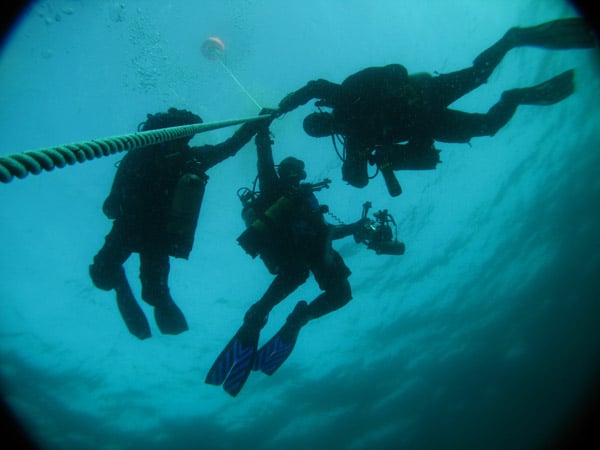
Divers completing a decompression stop after a 40 meter dive to the wreck of the ssFoilia off the Waterford Coast



























